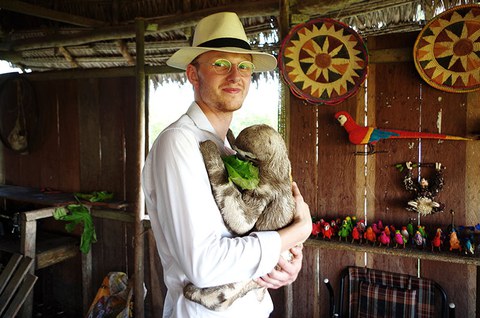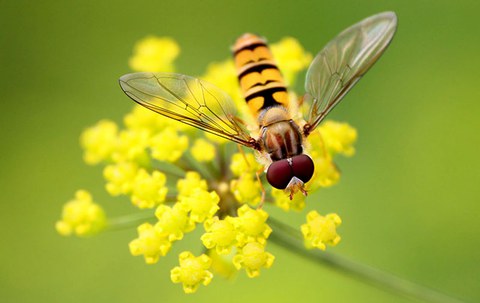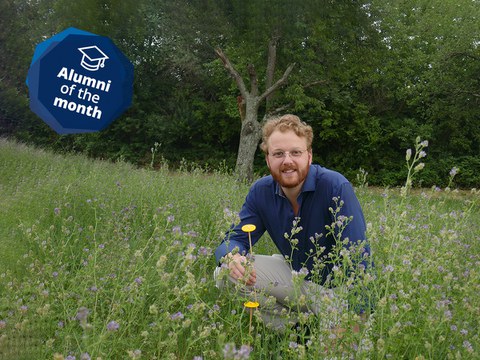Fasziniert von Ameisen und Schwebfliegen
(porträtiert im Jahr 2023)
Dagmar Möbius
Bevor er lesen konnte, waren für Maximilian Pink Tierlexika das Größte. Er schaute am liebsten Tierfilme im Fernsehen und etwas anderes als Biologe zu werden, kam für ihn nie in Frage. Warum der Saarländer für sein Master-Studium „ordentlich weit weg“ zog, was Ameisen für ihn bedeuten, warum die Taxonomie ein vernachlässigtes Feld“ ist und warum er im Moment künstliche Blüten bastelt, hat er „Kontakt-online" erzählt.
„Ich war als Kind ein unverbesserlicher Besserwisser“, schmunzelt Maximilian Pink. „Ich kannte alle Tiere aus den Lexika, die mir meine Eltern vorlesen mussten. Und ich bin wohl ein Beispiel dafür, dass zu viel Fernsehen nicht zwangsläufig schadet, denn ich habe von früh bis spät Tierdokus angeschaut.“

Maximilian Pink in seinem Metier.
Begeistert von Taxonomie
In Konstanz studierte Maximilian Pink Biologie. Auf seinen Bachelor-Abschluss 2017 folgte ein Master-Semester Biowissenschaften in Würzburg. Doch es zog ihn in den äußersten östlichen Zipfel Deutschlands. Am IHI in Zittau belegte er ab 2018 den englischsprachigen Master-Studiengang „Biodiversity and Collection Management“ (heute: „Organismic and Molecular Biodiversity“). „Der spezielle Schwerpunkt Taxonomie begeisterte mich. Dabei empfand er Ostsachsen viel angenehmer als dessen medialer Ruf. „Ich habe die Zeit sehr genossen und viele Menschen erlebt, die sich engagieren, auch gegen rechts“, hebt er hervor.
Nötige Grundlagenforschung, vor allem in den Tropen
Fachleute in Taxonomie treffe man heute im Museum, sagt der 29-Jährige und lacht: „Aber eigentlich sind sie vom Aussterben bedroht.“ Sie teilen Organismen (Tiere, Pflanzen, Pilze usw.) in Gruppen ein wie etwa Arten, Gattungen und Familien und müssen sehr viel Wissen über die einzelnen Organismen haben. „Es gibt noch viel Arbeit“, erklärt Maximilian Pink. Käfer sind nach heutigem Stand die größte Organismengruppe. „Sobald man die westliche Welt verlässt, ist sehr viel zu tun in puncto Beschreibung neuer Arten. Das ist eine Form von Grundlagenforschung.“ Vor allem in tropischen Gebieten, in die er mehrere Male reiste, bestehe ein großer Nachholbedarf. In Peru war er 2017 drei Monate in einer Wildtierauffangstation tätig, in Ecuador arbeite er auf einer Pilzfarm und in Kenia absolvierte er 2018 ein tropenökologisches Praktikum.
Zahllose Tier- und Pflanzenarten unterm Mikroskop
Mit 14 Studierenden seines Jahrgangs aus China, aus Kanada, aus der Mongolei, aus Nigeria oder aus Peru lernte Maximilian Pink als einer von drei Deutschen das Bestimmen zahlloser Tier- und Pflanzenarten. „Wöchentlich arbeiteten wir uns mit tollen Fachleuten aus dem Senckenberg Museum für Naturkunde Görlitz in neue Organismengruppen ein. Wir saßen viel vor dem Mikroskop“, erzählt er. Im Sommer fanden spannende Expeditionen statt. Eine Lehrkraft prophezeite dem jungen Biologen allerdings, er würde kein Taxonom werden, er habe zu viele verschiedene Interessen. Dabei war er doch ausgerechnet wegen des Ameisen-Spezialisten Bernhard Seifert in die Oberlausitz gekommen. Dennoch bezeichnet er alles Gelernte als sehr wertvoll.
Das Faszinierende der Ameisen
Apropos Ameisen. Für die als Fleißtiere bekannten Geschöpfe hat Maximilian Pink ein besonderes Faible. Schon in seiner Bachelor-Arbeit beschäftigte er sich mit dem Verhalten von Ameisen. „Das ist total spannend“, schwärmt er. „Die einzelne Ameise ist zwar kein Genie, aber aufgrund von simplen Gruppenregeln kann sie komplexe Verhaltensweisen zeigen: flexibel und angepasst.“ Weil das so ist, hält er Ameisen sogar als Haustiere, was keineswegs so leicht ist, wie es klingt. Seine Master-Arbeit schrieb er über ein agrarökologisches Thema in Göttingen. Dabei ging es um Fragen unserer Zeit: über die Diversität landschaftlicher Strukturen, deren Nutzen und wie Lebensmittel angebaut werden. „Manche Sachverhalte in der Agrarökologie sind ein Politikum, vor allem in Europa“, erklärt Maximilian Pink. Aber viele Maßnahmen und Methoden könnten leicht umgesetzt werden. Das treibt ihn an.
Schwebfliegen und künstliche Blüten

Schwebfliegen (Syrphidae) sind wichtige Nützlinge im biologischen Pflanzenschutz. In Europa kommen mehrere hundert Arten vor. Etwa ein Drittel dieser Arten ernährt sich von Blattläusen oder anderen kleinen blattfressenden Insekten.
Trotz des mit 1,2 benoteten Abschlusses war es für den jungen Biodiversitätsexperten nicht leicht, mit dem Master-Abschluss 2021 eine Arbeit zu finden. Er dachte an einen Abstecher in die Entwicklungshilfe. Suchte eine Doktorandenstelle und sah sich mit einem „Stau auf dem Arbeitsmarkt“ konfrontiert. „Ich habe sogar ein paar Monate im Supermarkt gearbeitet“, sagt er. Durch Zufall fand er seine jetzige Stelle am Julius-Kühn-Institut Dossenheim. Seit Juli 2022 ist er wissenschaftlicher Mitarbeiter in Teilzeit und beschäftigt sich mit der Methodenentwicklung im Insektenmonitoring. „Der Wissenschaft ist vor einigen Jahren aufgefallen, dass wahnsinnig viele Insekten fehlen“, erzählt Maximilian Pink. Dies ist insbesondere im Agrarbereich relevant. Schwebfliegen sind beispielsweise sehr nützlich als Bestäuber und weil ihre Larven Blattläuse fressen. Die Bestandsmengen müssen überwacht werden. Damit Insekten für Forschungszwecke nicht gefangen und getötet werden müssen, entwickelt Maximilian Pink mit seinen Kolleginnen und Kollegen zum Beispiel standardisierte künstliche Blüten. „Wir hoffen, dass sich die Insekten darauf setzen und DNA hinterlassen, die wir dann abwischen und analysieren können“, beschreibt er. Noch ist unklar, ob es gelingt. Auch KI-gestützte Kameras kommen zum Einsatz.
Quo vadis?
Seine wissenschaftliche Arbeit vereinfacht darzustellen, ist Maximilian Pink vertraut. An seinem Institut für biologischen Pflanzenschutz ist er auch für Bürgerwissenschaften zuständig. Komplexe Zusammenhänge laienverständlich herunterzubrechen, gehört zu seinen Herausforderungen. Ein Taxonom ist aus ihm tatsächlich nicht geworden. Aber das ins Studium in Zittau eingebundene Expertennetzwerk, die Übersicht über die Literatur und die eigene gewonnene Erfahrung helfen ihm täglich in seinem beruflichen Alltag. Noch weiß er nicht, wie es nach seiner befristeten Stelle konkret weitergeht. „Ich würde gern in der Forschung bleiben und promovieren“, sagt der jetzt in Heidelberg Lebende. Aber er kann sich auch vorstellen, in der Agrarindustrie tätig zu sein.

Maximilian Pink ist Absolvent des Monats Dezember 2023
Kontakt:
Maximilian Pink M.Sc.
